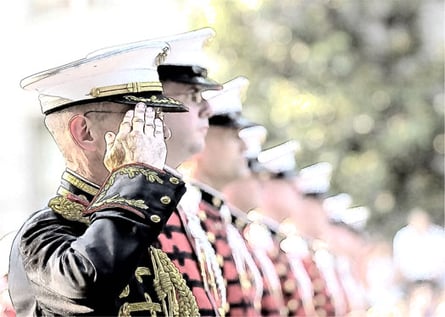This guest post was authored by Michael Marlowe, former managing director/director of government relations for the Automation Federation.
Automation jobs require a combination of technical know-how combined with interpersonal skills, making them a great fit for veterans.
It’s always difficult to find suitable candidates for openings in industrial automation as most of these jobs require both technical and interpersonal skills, often with a bit of management expertise added to the mix. Universities graduate hundreds of thousands of mostly young men and women every year with business and liberal arts degrees, and many of these grads have excellent interpersonal skills, but generally aren’t very technical.
Engineering and other STEM graduates have the required technical background, but are always in short supply and command very high salaries. And many of these grads are a bit lacking in interpersonal skills as they have spent their formative years relentlessly hitting the books, not developing relationships.
As far as management skills, these are best gained through on-the-job training, where actual supervision takes place. Unfortunately, not many candidates for entry- and mid-level automation jobs have this type of experience.
Veterans easily transition to automation sector
But veterans naturally combine all three of these skills, as just about every position in each branch of the military requires training and hands-on experience in one or more technical areas. Interpersonal skills are developed by forced close cooperation among those serving, and many relatively young veterans have impressive experience managing teams as commissioned and non-commissioned officers (NCOs). If fact, many would say NCOs, in particular, make great job candidates because they have risen through the ranks to become the backbone of the Army and Navy as sergeants and petty officers, respectively.
Preston Mihalko and Nick Abbenante are two great examples of veterans who have made the successful transition from the military to industrial automation, and their stories illustrate how their skills seamlessly transferred from the military to the civilian sector.
Preston Mihalko
 Preston Mihalko spent three years as a service warfare officer in the Navy. He was onboard a ship for much of this time as his specialty was antisubmarine warfare. Technical training was part of daily life as he was required to understand ship operations, as well as the specialized equipment used to detect submarines.
Preston Mihalko spent three years as a service warfare officer in the Navy. He was onboard a ship for much of this time as his specialty was antisubmarine warfare. Technical training was part of daily life as he was required to understand ship operations, as well as the specialized equipment used to detect submarines.
Preston found the specific skills he learned in the Navy transferrable to the field of industrial automation. “I was able to apply shipboard systems and concepts to understand industrial automation issues. Interaction with equipment on a daily basis helped me to gain hands-on experience and understanding, which I found applied both on board a ship and on land. In terms of intangible benefits, I gained the ability to network with co-workers through my interactions with other Navy personnel,” he notes.
Fittingly, Preston uses nautical terms to describe the position he’s held for the last three years working in outside sales for an automation distributor based in the Maryland/Washington, DC area. “I’m the captain of my own destiny in outside sales, and I enjoy marketing myself along with the brands I represent. The challenge of the uncertainty and having to figure out solutions is also appealing,” he indicates.
Nick Abbenante
 As the iconic ad intones, the Marines are “looking for a few good men.” Nick Abbenante thought he might fit the bill, and he ended up serving for four years as a Marine Corp First Commander Infantry Officer. In this position, his worked as a military occupational specialist in the areas of combat and weapons.
As the iconic ad intones, the Marines are “looking for a few good men.” Nick Abbenante thought he might fit the bill, and he ended up serving for four years as a Marine Corp First Commander Infantry Officer. In this position, his worked as a military occupational specialist in the areas of combat and weapons.
Nick combined his skills and training to find the type of job he wanted in industrial automation, where he’s worked for the last two years as an outside sales rep with responsibility for the company’s Maryland territory. He works very closely with process plant personnel in this position to help them analyze applications, and specify the proper equipment to solve problems and optimize processes.
Click this link to read more about the experiences of Preston Mihalko and Nick Abbenante, veterans who easily transitioned their military skills to careers in the industrial automation and manufacturing sectors.
About the Author Michael Marlowe, CNM, is former managing director/director of government relations for the Automation Federation.
Michael Marlowe, CNM, is former managing director/director of government relations for the Automation Federation.



